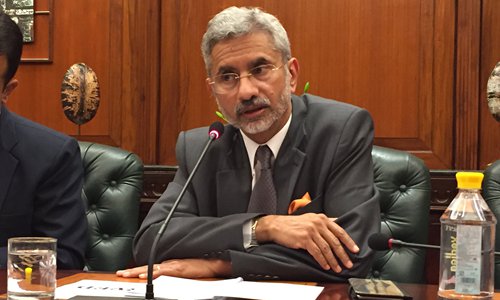
Foreign Secretary Subrahmanyam Jaishankar speaks to the Global Times during an interview in New Delhi. Photo: Li Qian/GT
Indian External Affairs Minister Subrahmanyam Jaishankar will visit the US from Monday to Friday. Before the visit, Jaishankar's remarks on an event hosted by The Financial Times and The Indian Express laid out India's geopolitical calculus in a world that is being shaped by two dominant powers - China and the US.
During this event, Jaishankar signaled that New Delhi won't abandon difficult dialogue with China, nor is it panicking into military alliance with the US. Such comments ahead of the visit seem intended to tell Washington that New Delhi's foreign policy will continue to be in the best interest of its own country. This means that India will not give up its strategic independence or take sides. This is India's carefully crafted tone before the visit.
With the Quad mechanism evolving, Washington has been increasing its pressure on New Delhi with growing demands. At first, the US failed to provide timely help after the extreme virus outbreak in India. Washington then dispatched some relief materials to India under the pressure of the global public opinion. Under the US' pragmatic concept, it hopes that India will pay Washington back in return. As such, it is highly likely that Washington will put forward higher requirements to New Delhi during Jaishankar's visit.
"The issue of vaccine procurement is expected to be a key agenda item during Jaishankar's interaction with US leadership and other stakeholders," News agency ANI reported on Monday. If this is to be achieved, New Delhi will have to pay a diplomatic price in exchange. Setting the tone ahead of the visit may also avoid Washington's demands that New Delhi should intensify its confrontation with Beijing in exchange for vaccine cooperation. It is unclear how much India will compromise.
However, India's policy toward China and the US follow two strategic lines. India will not change its policy toward China just because the US requires it. This demonstrates that India sees itself as a great power with diplomatic independence.
When the coronavirus became deadly serious in India these past few months, the indifferent attitude from the US led to many dissatisfactory voices in India. This has had a great impact on the thinking of the Indian people and public opinion. It again showed the world that neither Trump nor Biden can change the fact that "American First" is always the priority of US foreign policy. It also showed the true value and weight of India in the US Indo-Pacific Strategy.
Amid the Indian public's concern about the US, Jaishankar's visit to the country will likely show Washington that asking New Delhi to take a side and choose the US will not succeed in this situation.
Soon, it will be one year since troops from China and India clashed in the Galwan Valley. Although the border issue has been a major topic in China-India relations, it is unlikely to worsen in the short term due to the epidemic situation in India. There are some forces in New Delhi attempting to use the border issue to divert attention from its domestic epidemic. However, conflicts will probably not erupt again under the constraints of peaceful bilateral dialogues.
New Delhi and Washington will not become real allies, because India will not give up its strategic autonomy. India will only become a US "ally" in some fields, but it will not become another Japan or Australia that are allied with the US.
There is new content in New Delhi's non-alignment policy: It is now looking for multilateral alliances. Also, New Delhi and Washington can form security alliances as non-allies, but will have differences over issues such as climate change.
The Indian Express mentioned that, "India wants a good neighbourly relationship with China while also realising the full potential of its partnership with the US, and more broadly, with the West." The best way for India to maintain its balance against China and the US is to return to the state of affairs before the border conflict with China and tilt a little bit away from the US.
The author is director of the research department at the National Strategy Institute at Tsinghua University. opinion@globaltimes.com.cn




